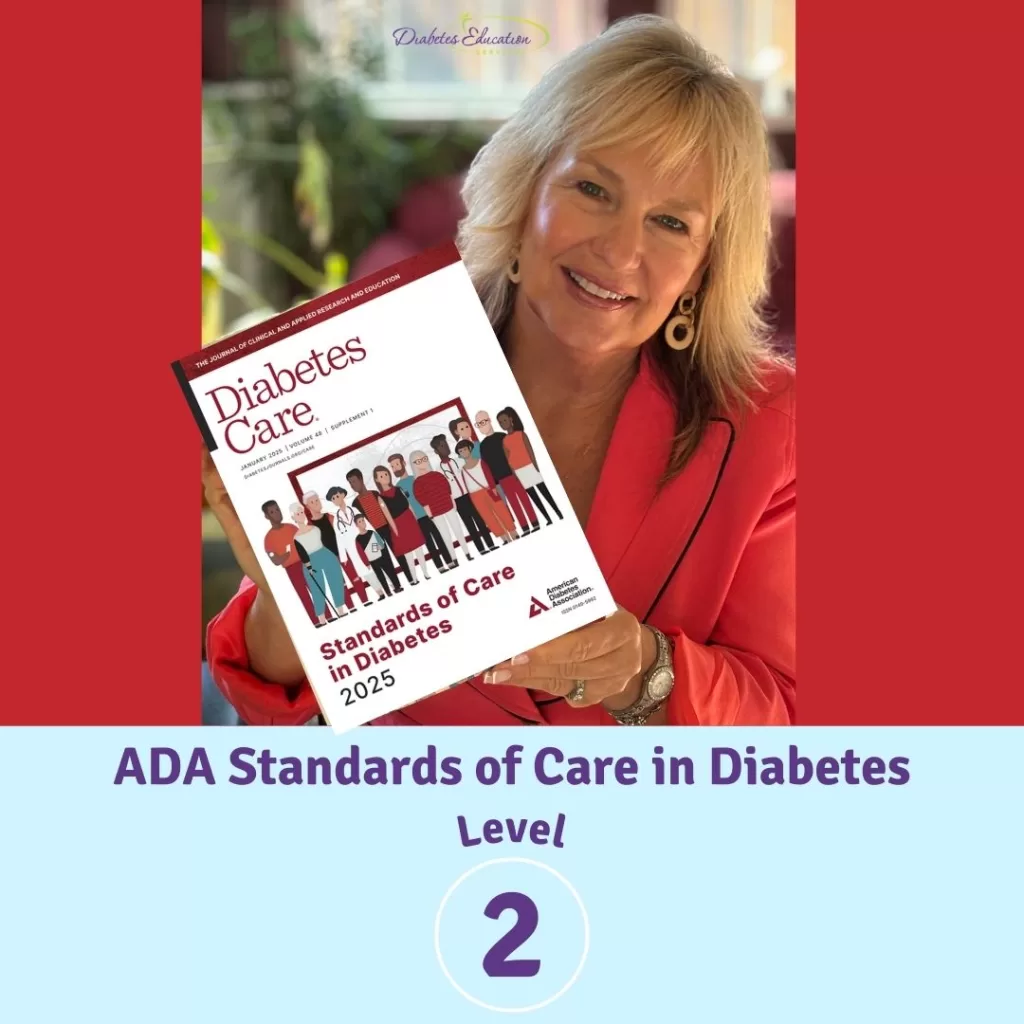For last week’s practice question, we quizzed participants on 2025 ADA Standards & hyperglycemic crises. 43% of respondents chose the best answer. We want to clarify and share this important information, so you can pass it on to people living with diabetes and your colleagues, plus prepare for exam success!
Before we start though, if you don’t want any spoilers and haven’t tried the question yet, you can answer it below: Answer Question

Question: What do the NEW 2025 ADA Standards Say?
According to the Newly Published 2025 Standards of Care, which of the following statements reflect the latest guidelines to treat hyperglycemic crises?
Answer Choices:
- Administer low dose basal insulin analog in addition to intravenous insulin infusion to improve glucose management.
- If serum pH is below 7.4, administer IV bicarb, along with a glucose infusion to resolve severe acidosis.
- To differentiate between DKA and HHS, the most important lab indicators are the anion gap and glucose levels.
- Lactated Ringers is now the preferred intravenous solution for fluid resuscitation.

Getting to the Best Answer
Answer 1 is correct. 43.04% chose this answer. “Administer low dose basal insulin analog in addition to intravenous insulin infusion to improve glucose management.” YES, great job, this is the best answer. According to ADA Standard 16 on Hospital Care, “Studies have reported that the administration of a low dose of basal insulin analog in addition to intravenous insulin infusion may prevent rebound hyperglycemia without increased risk of hypoglycemia.”
Answer 2 is incorrect. 19.59% of you chose this answer. “If serum pH is below 7.4, administer IV bicarb, along with a glucose infusion to resolve severe acidosis.” Since this pH is in the normal range, this person is not in ketoacidosis. According to ADA Standard 16 on Hospital Care, “Several studies have shown that the use of bicarbonate in people with DKA made no difference in the resolution of acidosis or time to discharge, and its use is generally not recommended.”
Answer 3 is incorrect. About 20.10% of respondents chose this. “To differentiate between DKA and HHS, the most important lab indicators are the anion gap and glucose levels.” According to the 2024 Consensus Statement, to differentiate between the two conditions, the most decisive lab indicators are beta hydroxybutyrate or urine ketones to verify insulin deficiency along with pH levels to verify acidosis and osmolality to determine hydration status in HHS.
Finally, Answer 4 is incorrect. 17.27% chose this answer. “Lactated Ringers is now the preferred intravenous solution for fluid resuscitation.” According to the 2024 Consensus Statement, Normal saline or Ringer’s lactate are both accepted IV rehydration solutions.
You are invited to register for our Hyperglycemic Crises – New criteria and treatment guidelines for DKA, Euglycemic DKA and HHS | 1.25 CE – Recorded and Ready for Viewing.
We hope you appreciate this week’s rationale! Thank you so much for taking the time to answer our Question of the Week and participate in this fun learning activity!
Want to learn more about this question?
Join us live on Jan 30, 2025 for our
ADA Standards of Care
Level 2 | Standards of Care Intensive

This course, updated annually, is an essential review for anyone in the field of diabetes. Join Coach Beverly as she summarizes the annual updates to the American Diabetes Association’s (ADA) Standard of Medical Care in Diabetes & provides critical teaching points & content for healthcare professionals involved in diabetes care & education.
Objectives:
- A review of changes & updates to the annual ADA Standards of Medical Care in Diabetes.
- Identification of key elements of the position statement.
- Discussion of how diabetes educators can apply this information in their clinical setting.
Learning Outcome: Participants will identify updates and articulate recommendations from the 2024 ADA Standards of Care that can be applied to their practice.
Target Audience: This course is a knowledge-based activity designed for individuals or groups of diabetes professionals, including RNs, RDs/RDNs, Pharmacists, Nurse Practitioners, Clinical Nurse Specialists, Physician Assistants, and other healthcare providers interested in staying up to date on current practices of care for people with prediabetes, diabetes, and other related conditions. The practice areas for RDs/RDNs for CDR reporting are healthcare, preventative care, wellness, and, lifestyle along with, education and research.
Why Attend These Webinars?
- Accessible learning: All webinars are available online, so you can attend from the comfort of your home or office.
- Expert-led: Presentations are led by experienced diabetes educators, healthcare professionals, and researchers.
- Practical advice: Each session is designed to give you actionable strategies that can be applied in your daily life or practice.
- Up-to-date information: Stay informed about the latest research, guidelines, and technology in diabetes care.
How to Register?
Register above or simply visit our website.
For more information or any questions, please email [email protected].
All hours earned count toward your CDCES Accreditation Information
Sign up for Diabetes Blog Bytes – we post weekly Blog Bytes that are informative and FREE! Every week we post one exam practice Question of the Week and Rationale of the Week. Sign up below!
The use of DES products does not guarantee the successful passage of the certification exam. CBDCE and ADCES do not endorse any preparatory or review materials for the CDCES or BC-ADM exams, except for those published by CBDCE & ADCES.









